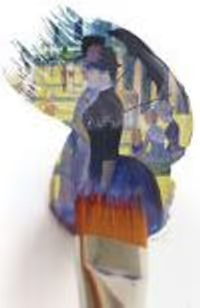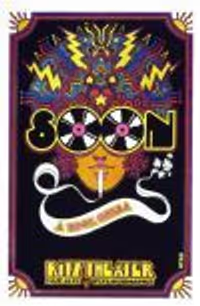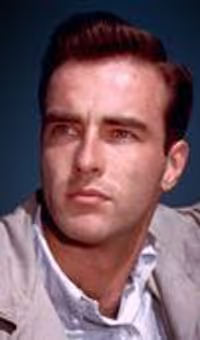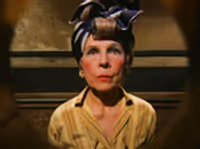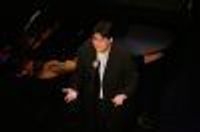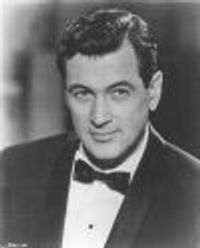Composer v. Orchestrator
elmore3003
Leading Actor Joined: 3/31/04
#25re: Composer v. Orchestrator
Posted: 12/20/05 at 4:10pm
Actually, trude's first Rodgers show was CAROUSEL. The OKLAHOMA! ballet was assembled by a gentleman whose name I forget. And Balanchine did accept the "Slaughter on 10th Avenue" ballet as Rodgers wrote it. The "Big Brother" ballet in BOYS FROM SYRACUSE is longer in Rodgers' pencil manuscript, and the entire scenario for the piece is written out above the music. On the shows she did with Rodgers, she was obligated to use his themes for the basis of her composition but I think the way she transformed the "working at the mill" music and "blow high blow low" in the hornpipe for CAROUSEL, I believe she was a real genius. Most of the composers in the "golden age" needed orchestrators to score because there was often so much writing of new material out of town. Don Walker is credited with scoring CAROUSEL but he was so tied up with the Act Two ballet and deMille's revisions, I think nearly every number in Act Two is ghost-written.
Leonard Bernstein is co-orchestrator with Hershy Kay on the 1956 CANDIDE, but there was new material going in and out every day in Boston. Bernstein could not have written music and orchestrated as well during all that chaos.
Updated On: 12/20/05 at 04:10 PM
#26re: Composer v. Orchestrator
Posted: 12/21/05 at 10:08amSorry to go back in the converation, but doesn't ALW have sole orchestrators credit for the original concept albums of JCS and Evita? I'm pretty sure I read in an interview that he'd done some kind of orchestration course at university...
#27re: Composer v. Orchestrator
Posted: 12/21/05 at 10:46am
Yes, Lloyd Webber did do the original orchestrations for a symphony orchestra for both the "Superstar" and "Evita" concept albums. They were scaled down - Lloyd Webber retained sole credit on "Superstar", and long-time veteran Hershy Kay did the reduction on "Evita" (they both get credit.)
The introduction to the published script of "A Little Night Music" has a great essay by Jonathan Tunick about how he worked with Sondheim to pin down the sound of the show, and is one of the best accounts I've read of a theatre orchstrator talking about their work. It's also in the Sondheim anthology of scripts.
Jazzysuite82
Broadway Legend Joined: 2/6/05
#28re: Composer v. Orchestrator
Posted: 12/21/05 at 11:39amTunick is the best living orchestrator. I think he realizes the fundamental job of orchestration. Not only does he place intruments, but he does it in the style of whatever composer he's working with. If you listen to a Sondheim score he's orchestrated you say "oh that's Sondheim". Then listen to Marie Christine and you say "yup thats LaChiusa". Tunick doesn't have "his sound" he has the composer's sound, which is soooo important. He also knows where he stands in the heirarchy. I remember he worked on one of Cy Coleman's last shows. He did beautiful orchestrations for it. At one point Cy said "That cello line, what is that? I don't like it". Jonathan knew it wasn't his final decision so he just shruged and said "Ok let's take it out". That's what a good orchestrator does.
#29re: Composer v. Orchestrator
Posted: 12/21/05 at 11:50am
Tunick is the best living orchestrator
Amen to that! Like you said, his orchestrations always complement the composer, from Sondheim to Schoenberg. In fact, his beautiful orchestrations for Napoleon in London were the only thing that kept me in my seat for the second act!
#30re: Composer v. Orchestrator
Posted: 12/21/05 at 12:50pm
I also agree with Tunick as the choice for best living orchestrator. I met him once through a mutual friend, and my hand was literally shaking. I've met a lot of celebrated folks in my day, but rarely do I shake from nerves when introduced. I have that much respect for the man and his body of work. A very nice (quiet) guy, too.
I appreciate all these posts on the subject! I'm learning quite a lot from all of you. It's a subject near and dear to my heart. I've orchestrated a bit myself over the years (once for an 80-piece orchestra), and it's a fascinating, challenging "art."
blocked: logan2, Diamonds3, Hamilton22
Jazzysuite82
Broadway Legend Joined: 2/6/05
#32re: Composer v. Orchestrator
Posted: 12/21/05 at 2:06pmI would have to say that the next great orchestrator/arranger is Stephen Oremus. Honestly. Lots of people think he's hot and all that stuff, but he's an incredibly talented orchestrator/arranger/music director. His arrangements and orchestrations for ALL SHOOK UP are fantastic, not to mention his work on AVENUE Q, WICKED and TICK, TICK... BOOM!
#33re: Composer v. Orchestrator
Posted: 12/21/05 at 2:15pmIf I were the composer of a musical, today, I'd hire William David Brohn to do the orchestrations.
Jazzysuite82
Broadway Legend Joined: 2/6/05
#34re: Composer v. Orchestrator
Posted: 12/21/05 at 2:19pmStephen Oremus is really good. I'd like to see what he'd do with legit score like Piazza, or LaChiusa. If I couldn't get Jonathan Tunick, I'd prob try to get Bruce Coughlin. I really like his work.
#35re: Composer v. Orchestrator
Posted: 12/21/05 at 10:22pmBruce is incredibly talented. He did part of Light in the Piazza (not to mention numerous others... Urinetown, Wild Party, Gypsy, etc.). And he's a great man!
#36re: Composer v. Orchestrator
Posted: 12/21/05 at 10:27pmThis is a fascinating subject. I always wondered what the original orchestrations for MISS SAIGON sounded like. Was it Cameron Mackintosh who had them thrown out before the worled premiere? I'd love to hear them for a comparison.
#37re: Composer v. Orchestrator
Posted: 12/21/05 at 10:30pmI would love to hear more Vietnam sounds in MISS SAIGON.
Jazzysuite82
Broadway Legend Joined: 2/6/05
#39re: Composer v. Orchestrator
Posted: 12/21/05 at 11:23pm
This is so interesting; everyone on this board is very knowledgeable of everything Broadway related. Oh, I had a question while reading this thread. How does one become a arranger/orchestrator?
John3
#40re: Composer v. Orchestrator
Posted: 12/22/05 at 1:17amWith traditional instruments instead of just synthesizers, drums, brass and strings.
Jazzysuite82
Broadway Legend Joined: 2/6/05
#41re: Composer v. Orchestrator
Posted: 12/22/05 at 2:33am
I knew what you meant. It was sorta said tongue in cheek. It would be a little difficult to use those sounds in the pop score they wanted. In addition, Eastern music has a different scale system than the west does. It'd be VERY hard to use traditional instruments. You can actually hear some Eastern references in the music though.
Updated On: 12/22/05 at 02:33 AM
#42re: Composer v. Orchestrator
Posted: 12/22/05 at 3:26am
The 5th Avenue Theatre here in Seattle just did a production of SAIGON and they actually expanded the orchestra pit to include some traditional Vietnamese instruments. It added some cool layers to the score that weren't there before.
John3, I would assume that you would usually start off as either a music director, or an assistant to a composer, arranger or orchestrator. Just like anything else, you would have to climb the ranks, work on smaller shows and prove yourself. A degree in music wouldn't hurt, either.
rockfenris2005
Broadway Legend Joined: 4/10/04
#43re: Composer v. Orchestrator
Posted: 12/22/05 at 4:27am
Ok,
I have a few questions:
1) How much do arrangers and orchestrators actually cost? If you were working on a new musical and, say, you were presenting with an amateur group: would the fact that they be extremely expensive formidable to the show? If that's the case, and they are expensive, how do you work around that?
2) If someone writes a score in A Capella, as in "hummed", who gets the credit to those songs? Is the arranger then listed as composer as well? I think it would be fair to do that. And exactly how hard is the process of taking a hummed melody and turning it into a fully scored song?
#44re: Composer v. Orchestrator
Posted: 12/22/05 at 9:01am
Many times an orchestrator is chosen because of his or her 'touch'. The way they layer the orchestration or the variety or preferences for certain instruments will appeal to a certain composer and/or director.
The general tone of this thread is very true. There are SO MANY variations in what the orchestrator does and when they get involved. And some composers have been known to sit down with the orchestrator after seeing the first results (or even before the orchestrator starts working) and go over what they feel about the piece.
For example, if the composer wants something 'brighter' or more strident in a line to underscore the lyric, he or he might ask for a certain kind of horn.
#45re: Composer v. Orchestrator
Posted: 12/22/05 at 11:19am
Jazzysuite82 --- I put "art" in quotes because some people don't think of orchestration as an art form. Some see it as more of a necessary technical service and skill. Believe me, I've met plenty of those (bums).
I disagree with that philosophy, and my chosen word for this process is "art." Even if a lot of it is technical, tedious and meticulous. (As I said, I've done it myself before.)
blocked: logan2, Diamonds3, Hamilton22
rockfenris2005
Broadway Legend Joined: 4/10/04
#46re: Composer v. Orchestrator
Posted: 12/24/05 at 12:25am
Good, now before everyone starts interrupting me again (for the umpteenth time), does anyone know the answer to my questions?
Jazzysuite82
Broadway Legend Joined: 2/6/05
#47re: Composer v. Orchestrator
Posted: 12/24/05 at 1:33am
I really don't know of anyone who writes a capella. Especially full length musicals. Mel Brooks had more experience than that. i mean if you really wanted to write an accompinament out of a hummed piece, it's not hard to do at all. There should be a shared billing as far as the composer credit is concerned. I honestly don't know who would do that, not even novice composers.
Rates vary by orchestrator. The orchestrators fall under local 802, the musician's union I think when it comes to NY. I don't know what the union rate for arranging, but there's plenty of freelance people about. I would say if you've got a budget, find someone who'll work for that budget. There's always negotiating to be done. If anyone has anymore to add now would be the time.
Ya happy NOW?
rockfenris2005
Broadway Legend Joined: 4/10/04
#48re: Composer v. Orchestrator
Posted: 12/24/05 at 3:28am
Yes, I am happy now. Thank you
Interruptions are my pet peeve
#49re: Composer v. Orchestrator
Posted: 12/24/05 at 4:08am
Hi,
I'm a composer/orchestrator/arranger whatever and I've been reading all of your very interesting comments on this topic...I just wanted to add my two cents.
I, personally, think it is really important for a composer to be involved in the orchestration of his/her work. Obviously, the piece is your baby when you write it, and most people have a pretty specific idea of what they want the piece to accomplish/exist as.
With that said...there is nothing more wonderful than sharing a piece a music with someone who can bring some new shade of color to it. It's probably one of the most exciting things about writing music...sharing and building it. The collaborative efforts that exist especially in theatrical writing is what draws me to theatre more and more every day. Thanks you for the very refreshing topic!
I also just wanted to add a quick bit about the a capella question. I would say to definitely harmonize the music yourself. A melody has infinite possibilities until it is harmonized and given structure. If you are actually pretty sure what you want the mood/purpose/genre of the song to be, I would definitely add some sort of road map of harmonization before handing it over to an orchestrator because it will save you some reworking if the finished product is not what you expected/wanted. Just a suggestion. :)
Videos


